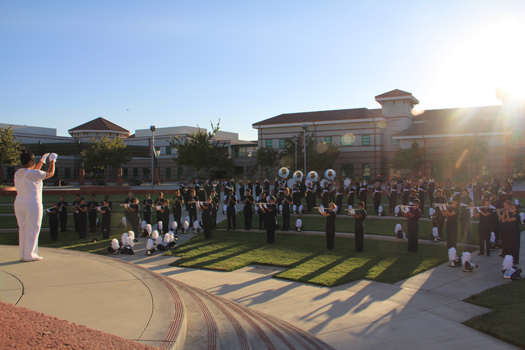Drum majors depend on their band directors for support and guidance—but what if there is no band director?
Photos by Lisa Boquist
It was the start of a new marching season for the Eleanor Roosevelt High School Blue Stampede in Eastvale, Calif. Feelings of excitement and nervousness spread across the 110 band members.
The excitement came mostly from the news that we were going to be competing in field tournaments after the program’s three-year absence from field shows; we had competed only at band reviews in the meantime.
After leaving the brass section to lead the band as head field drum major, not only was I excited to showcase my conducting abilities, but I was also determined to lead the band with all my strength at every field competition and halftime performance. I knew that I could achieve greatness with the help of the band, other student leaders, and my band director.
My drum major journey began on that positive note but slowly became a rollercoaster ride. I first conducted the band through our “Les Misérables” field show music and assisted my band director in teaching marching basics during summer band camp. As the band’s marching steps and individual parts of the music came together, I began to be hopeful about the band’s progress and a memorable senior year for me. It did end up being memorable—but not in the way I had expected.
My band director suddenly resigned to take another job two days before the school year started.
Who Am I?
No one in the entire band program expected this surprising departure. The majority of us could not understand why this had happened, especially me. I felt as if the fate of the band rested entirely on my shoulders. The burden felt almost unbearable, but I never allowed myself to give up.
I chose to give the band my time and my strength, regardless if there was a band director or not. On top of conducting, I had to perform more duties, such as coordinating drill and talking to administrators to reserve our performance slots. My student status sometimes prevented me from fulfilling the band’s requests. Like the title of our closer piece (which we never got to perform), I was definitely “On My Own.”
For approximately four weeks, we had no director, and each rehearsal became more and more strenuous. A typical rehearsal consisted of one-hour sectionals, 45 minutes of ensemble rehearsal, and 75 minutes on the field for drill.
One of the main problems was that the student leaders, instructional staff, and I were all trying to teach marching basics and the first few dots of the field show. Unfortunately, this scenario resulted in conflicting teaching styles and a loss of motivation. Some students even left rehearsal with the mentality that the band was falling apart, and that there was no possibility that the band was going to be performance ready by the first football game. I slowly began to think they were right; we had only learned five sets in three weeks.
One Day More
One of the lessons I learned along the way is that I shouldn’t feel the need to keep a strong attitude all the time. It was no secret that the band program was nowhere near ready for a performance, and I was struggling to prepare them. I remember during the Monday rehearsal before our first game, I told the band to arc up, but then I had to ask another student leader to run the music. I stayed behind, crying my eyes out. This was not the memorable season I had longed for. I was just miserable.
A staff member saw me crying and approached me. She reassured me of a few points that I had not considered before: I had kept the band stable enough for the new band director to step forward, I was selfless because I put the band’s success before my own well-being, and I had continuously persevered even though the season did not go the way I wanted.
She was right. Once I composed myself, I continued to lead the rehearsal with the staff by my side. Unfortunately, we did not perform at the first football game due to an unrelated logistical miscommunication with school staff.
Once the new director came, the band only participated in parade competitions, so I only conducted the field show at football games.
I could have quit the day my band director resigned. It would have been easy to give up, thinking my last year in marching band wouldn’t be an enjoyable one, but that wasn’t the right choice for me. I originally chose to be a drum major because I wanted to help the band reach excellence, not just with awards, but also with a feeling of accomplishment. As the season progressed, my conducting abilities became my last priority.
At the End of the Day
To be a leader is to be a giver under any circumstances. This season taught me that we should always give all of our effort and skill to our band members, even when times are hard.
I persevered all the way to the end of the season. Indeed, leading the band was anything but simple, but every rehearsal and competition was definitely worth it. I strengthened my friendships and created hilarious memories with other band members, especially with the brass and saxophone players.
At our performances, the band members performed their hearts out, and I couldn’t be any more proud of them. After seeing our six trophies from parade competitions and receiving an invitation to the Fiesta Bowl Parade for next year, I couldn’t be any happier with my decision to stay.


